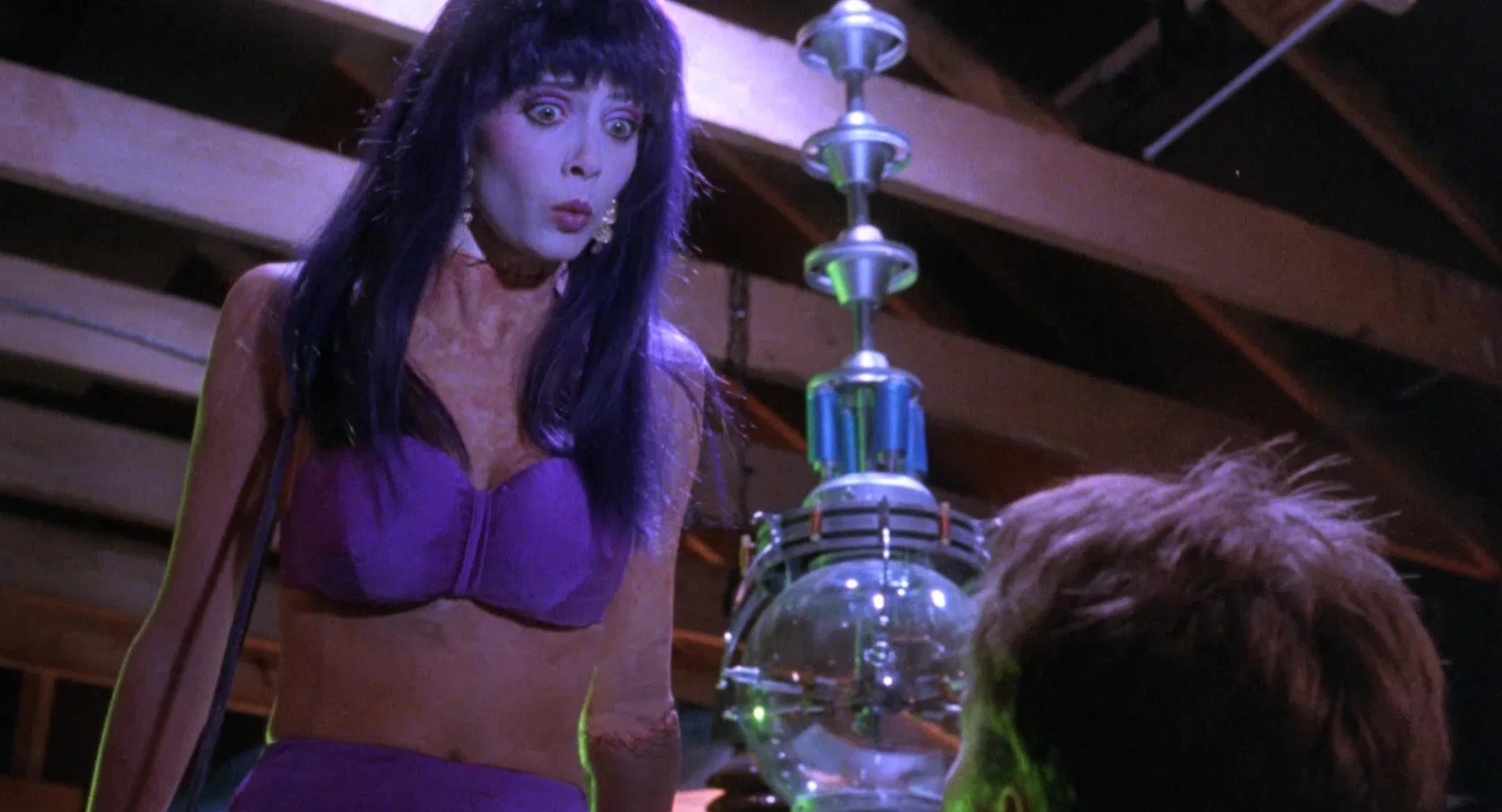Frankenhooker – Film Review
Published October 31, 2025

Frank Henenlotter’s 1990 cult oddity Frankenhooker occupies a unique — and proudly disreputable — place in horror-comedy cinema. Equal parts splatterfest, midnight-movie farce, and warped social satire, the film stands as one of those experiences that feels less like a traditional film and more like a fever dream stitched together from grindhouse grit and late-night cable chaos. It’s crude, absurd, purposefully offensive, and defiantly ridiculous. And while it doesn’t always land its gags or pacing, there’s a scrappy charm and a strange sincerity pulsing beneath its stitched-together purple-gore exterior.
A loose riff on Frankenstein, the film follows Jeffrey Franken, a grief-stricken medical tinkerer whose fiancée Elizabeth meets a gruesome, bizarre demise in a freak lawnmower accident. Unable to accept her death, Jeffrey concocts a mad plan to rebuild her using the remains of New York City sex workers and resurrect her with a homemade “supercrack” scheme that could only exist in the delirious logic of Henenlotter’s universe. The result: a resurrected “Frankenhooker” with a stitched-up past, an electrified presence, and a tendency to repeat street-corner phrases with manic gusto.
Even by the often-gonzo standards of late-80s and early-90s splatter cinema, Frankenhooker stands out for its gleeful anti-subtlety. It proudly embraces exploitation tropes while pushing them into exaggerated, satirical territory. Henenlotter is not aiming for scares — he’s aiming for shocked laughter, gross-out curiosity, and head-scratching bewilderment. Anyone expecting refined horror or character-driven drama will likely find the film abrasive or juvenile. But for viewers tuned into its wavelength, the chaotic energy and unabashed weirdness are part of the charm.
Where many exploitation films of the era simply lean into sleaze, Frankenhooker injects a surprising amount of craft and comedic intention. It’s knowingly trashy, not lazily so. Its cartoonish violence, neon-purple lightning effects, and off-kilter prosthetics turn the grotesque into an aesthetic — like a toxic-waste comic book come to life. The movie never wants you to take any of its depravity seriously, and that tonal clarity is something that sets it apart from lesser genre efforts.
James Lorinz delivers a delightfully eccentric performance as Jeffrey, the film’s hapless but oddly lovable necromantic engineer. Instead of portraying Jeffrey as a cold, brooding scientist, Lorinz plays him as a nervous, anxious, blue-collar tinkerer from New Jersey with a slightly unhinged charm. His performance walks a careful line between comedic excess and genuine pathos — a man who, in his deeply misguided way, just wants to bring back the woman he loves.
There’s a manic energy to Lorinz’s monologues, whether he’s ranting about electrolyte brains, soldering flesh like a backyard mechanic, or nervously spiraling into moral crises. His delivery often becomes the film’s comedic backbone, grounding the outlandish premise in a character who feels strangely real amidst the chaos. He’s not a genius tortured by ambition; he’s an everyday screw-up who got lost in grief and insanity, and that grounded take makes the absurdity hit harder.
As the resurrected Elizabeth, Patty Mullen gives a broad, physical, and wonderfully committed performance that has rightly earned cult status. Her jerky, zombified movements, wide-eyed expressions, and uncanny delivery — half fembot, half electrocuted corpse — perfectly capture the movie’s blend of slapstick and horror. Her performance is pure genre dedication; she embodies the film’s irreverent tone with electric precision.
Mullen manages to turn what could have been a one-note joke into an oddly memorable presence. Even when spouting broken phrases and twitching like reanimated circuitry, she brings a sense of vulnerability that flickers beneath the cracked makeup and stitched flesh. It’s not subtle acting, but Frankenhooker isn’t a subtle film. She nails exactly what’s required — and elevates it.
Underneath the grotesque comedy, Frankenhooker does offer satirical commentary — albeit drowned in slime and shock humor. It lampoons mad-scientist tropes, skewers patriarchal impulses to “rebuild” women to idealized standards, and mocks late-80s New York vice culture in equal measure. However, whether the satire lands depends heavily on the viewer’s tolerance for the aesthetic of exploitation cinema. The film is intentionally trashy — and while it sometimes reads as commentary on its own exploitation elements, other times it simply indulges in them.
Some jokes feel timeless in their absurdity; others feel dated or insensitive. The movie is proudly unfiltered, the kind of production that embraces bad taste as an ethos. There’s a charm in its earnest crudeness, but modern audiences may find parts of it grating or tone-deaf.
What truly makes Frankenhooker memorable is its special-effects bravado. The prosthetics, animatronics, and practical gags — from pulsating flesh to explosive set-pieces — are unapologetically cartoonish, leaning more toward Looney Tunes with body parts than realism. The film’s infamous “supercrack” sequence, in particular, is a delirious mix of grotesque creativity and outright insanity.
Henenlotter’s work here mirrors the DIY spirit of contemporaries like Peter Jackson’s early films (Bad Taste, Dead Alive) and Sam Raimi’s Evil Dead II. There’s genuine artistic vision in how the grotesque is staged — a love for practical effects and a refusal to play it safe or predictable.
Frankenhooker’s biggest flaws stem from pacing and repetition. The middle of the film occasionally drags, caught between setup and payoff. Some gags linger too long, and the narrative meanders before it reaches its gloriously unhinged climax. Not every joke lands, and its shock humor occasionally numbs rather than excites.
Additionally, despite flashes of thematic subtext, the film isn’t particularly interested in exploring its ideas beyond surface-level absurdity. That’s fine for what it is — a midnight-movie romp — but it keeps the movie from transcending its niche appeal.
Frankenhooker is a film best enjoyed with an open mind, a strong stomach, and a taste for outrageous cult cinema. It’s messy, loud, frequently offensive, and proudly low-rent — but also inventive, oddly heartfelt, and bursting with gonzo creativity. This is a movie made by people who loved B-movies and saw beauty in absurdity.
